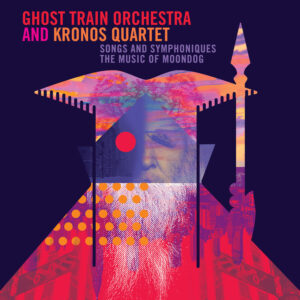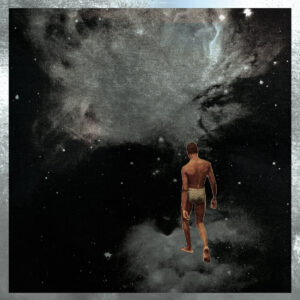Kronos Says Goodbye to Two Members After a Hello to Moondog and Sun Ra

Many are celebrating the tenures of two members of Kronos Quartet – violinist John Sherba and violist Hank Dutt – who are, after more than forty-five years, retiring from the group at the end of June.
As a valediction, I have been listening to and enjoying recordings from throughout their catalog. I am impressed by how enduring the quartet’s creative vitality and imagination has persisted, even on their most recent outings.
Joined by the Ghost Train Orchestra and a number of guest vocalists, last Fall Kronos released Songs & Symphoniques: The Music of Moondog. Louis Hardin, AKA Moondog, AKA The Viking of Sixth Avenue, shares moments of whimsy and often playful titles. Artists could take that an imprimatur to always playfully play it, but not on Songs & Symphoniques. Indeed, I’ve long been impressed with Moondog’s self-taught craft. His madrigals and canons, written down in Braille and then “translated” for seeing musicians, are at times quirky, but are often substantial pieces. Kronos and colleagues emphasize this, as well as the emotive character of his songs’ lyrics.
Rufus Wainwright joins with a backing vocal chorus and a number of the instrumentalists in one such canon, “Be a Hobo.” While maintaining the canonic structure, it is arranged to allow close-miked Wainwright to act as its focal point, thus functioning as both song and contrapuntal excursion. Marisa Nadler performs “High on a Rocky Ledge” with her characteristic dark-hued lyricism, adding duplicate vocal tracks for the chorus. The quartet and an electric guitar play the tune’s descending riff and a series of Tin Pan Alley chords to flesh out the piece. “I’m This, I’m That” features a gravelly-voiced, affecting rendition by Jarvis Cocker. Contributing an alto lead vocal and joined by other singers for a round, Petra Haden also memorably channels Annie Ross in her high soprano line on “Down is Up,” giving it the flavor of a cappella jazz.
“Enough About Human Rights” is a humorous text that is delivered with a wink by Karen Mantler and the quartet, who double on the vocal chorus. The song asks about the rights of a long list of animals, even skunks and bats, pointing out an even-handed ecological mindset that is a throughline in Moondog’s writings. She also sings on “Coffee Beans.” After a jaunty 6/8 groove is introduced by drums, jazz-inflected sax chords, pizzicato strings, and, ultimately, a wayward tune, Mantler sings a round about how to make the best coffee. At the conclusion, a harmonica solo adds a lilting counter-melody. Joan as Police Woman uses overlapping voices and vocoder to create a round on “Why Spend a Dark Night with You?” Hand-claps underscore the syncopation while electric guitar, saxophone, and the quartet add additional wisps of tunes, and then a raucous interlude. Mantler resumes the round in its former context, but in a new key, to conclude. A favorite is the duet between Sam Amidon and Aoife O’Donovan on “Behold.” Celtic folk fiddling style both in a solo and in the quartet accompanies their singing. Amidon takes the first verse in hyperkinetic fashion, O’Donovan’s rendition of the second resembles some of the inflections in the strings. The third verse treats the melody as a round, and the quartet provides a bluesy chord as a button.
In addition to the vocal turns, several well-conceived instrumentals are performed by Kronos and Ghost Train. “The Viking of 6th Avenue” is a calling card piece of Moondog’s; this was his nickname and mentions his stomping grounds. The arrangement incorporates pitched percussion instruments – xylophone, metallophones – that he performed when busking, but it also has a full jazz arrangement and the quartet playing in contemporary classical fashion – an extraordinary mash-up of styles that befits the polyglot musical approach to composition of Moondog. “Bumbo” features the lower brass alongside, again, high pitched percussion, with a Latin-tinged groove that supports saxophone and guitar solos. There’s a bit of Rain Dogs-era Tom Waits here, and one imagines that the Moondog albums might well have been on his mind when creating the Tom trilogy in the 1980s.
The recording concludes with another vocal track; Joan as Policewoman sings on “All is Loneliness,” which is one of the most poignant of Moondog’s creations. It is in canon, with saxophones and strings delivering the first few entrances gently, and Joan as Policewoman entering soon after with serene, sustained singing of the motive. It is a moving closer to a recording that reveals Moondog’s multitudes.
Out this month is another recording: Outer Spaceways Incorporated – Kronos Quartet and Friends Meet Sun Ra. This double LP is the fifth in Red Hot’s Sun Ra series, and by far the most substantial. Once again, prominent collaborators join the quartet to create new renditions of Sun Ra’s music as well as new compositions that both channel the visionary artist and extend his legacy.
The title track begins with spoken spacey glissandos in the strings, and a muted trumpet call. Then the vocalist Georgia Anne Muldrow sings the tune, doubled by Harrington, with supple tone and elegant phrasing. The arrangement by Jacob Garchik recasts the piece with emphatic music for strings but retains its linear gestural vocabulary. Electronic musician Jlin, known for her work with post-classical materials and creation of footwork singles, provides vociferous string chords and hand drums in her composition “Maji.” Laraaji adds synths and the flavor of New Age electronica on “Daddy’s Gonna’ Tell You No Lie.”
“Blood Running High” incorporates two hip hop artists – RP Boo and the duo Armand Hammer – rapping over a sax section and the quartet. Sun Ra’s spoken word recitations have undeniably been an influence on hip hop and here there is a tip-of-the-hat here in return. Moor Mother, DJ Haram, and 700 Bliss add reverberant production, samples, and rapping to “Secrets of the Sun.”
The centenarian bandleader of the Sun Ra Arkestra, saxophonist Marshall Allen, also appears on the recording. He joins Sex Mob and Laurie Anderson for “Images Suite,” one of two extended tracks on the CD. Post-bop horns and otherworldly electronics combine in a savory concoction that embodies the juxtapositions inherent in the music-making of Allen’s ensemble. Anderson adds treated vocals, and chimes accompany trumpeter/arranger Steven Bernstein. Allen gets multiple solo turns, displaying a rich tone undiminished by age. Anderson joins Allen and Kronos on “Phenomenon” and “The Wuz.” The resulting amalgam pays tribute to the eclecticism intrinsic to Sun Ra’s music while maintaining the tension between the various contributors’ own approaches. “Love in Outer Space,” featuring keyboards by Trey Spruance, imparts the tune with piano, organ, and synth playing that revels in Sun Ra signatures.
A second extended cut ends the recording with, appropriately enough, “Kiss Yo’ Ass Goodbye.” It is a lyric from Sun Ra’s famous and much-covered song “Nuclear War,” and here as well the notion of apocalypse is explored through the lens of Afrofuturism, in which the escape to space may be the only thing saving us from annihilation. The quartet is joined by Terry Riley, playing keyboards and singing, and vocalist Sara Miyamoto. It opens with portentous straight tone slides, almost like an air raid siren, which are joined by quick singing of the title in saucy fashion. The strings and percussion provide intense accompaniment and the glissandos change direction alongside an Ivesian amalgam of melodic fragments and a coda of overlapping voices (shades of Moondog’s canons).
From its outset and for a half century, Kronos has made many “cover albums.” Outer Spaceways Incorporated is among its most successful in terms of concept and execution. The quartet will continue performing and recording with two new members, violinist Gabriela Díaz and violist Ayane Kozasa.
-Christian Carey


